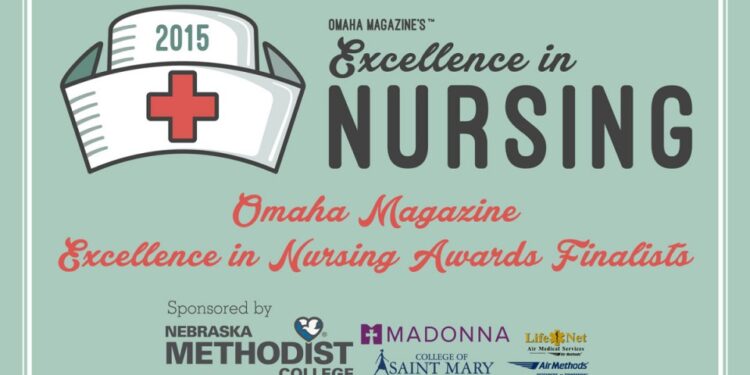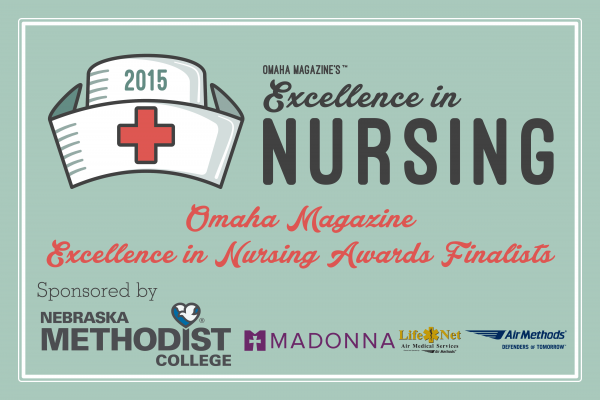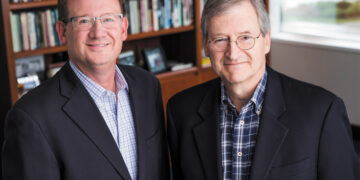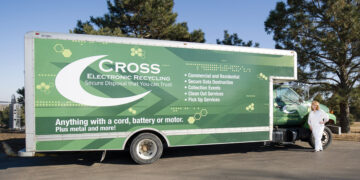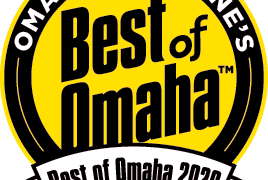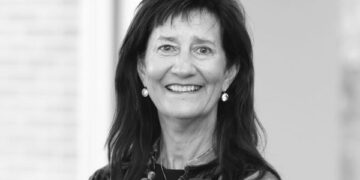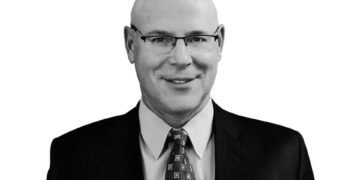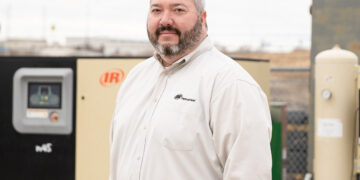OncologyrCheryl Bohacek rRN, MSN, OCN, Oncology NurserMethodist Hospital
Cheryl Bohacek remembers early on in her nursing career caring for a young woman with cancer who was dying. A group of the patient’s closest friends came to her room, opened a bottle of wine, reminisced, laughed, and cried with her. Then her husband came, laid down beside her and spent his final moments with his wife. It became a life-altering experience for Bohacek.
“I realized that I was not just passing medications, but I was a part of peoples’ lives,” she says. “I was caring for them during their most vulnerable moments, and I got to help them and their families get through it.”
Something touched Bohacek’s spirit that day, and she has never wanted to care for another type of patient population since.
“You become deeply vested in their outcomes, whether it’s by helping them through recovery, helping them deal with something they’ll have to live with for the rest of their lives, or helping them cope with end of life,” says Bohacek, who finds her profession very rewarding.
She balances the good days with the bad by always trying to start each day with a positive attitude.
“Even if you don’t feel good inside, if you keep smiling and have a positive outlook it presents a different feeling on the outside…and pretty soon, it becomes reality,” she says.
And it appears to be working. “Cheryl is our constant rock,” says one of her colleagues. “While many of my colleagues have burned out in oncology, Cheryl is always shining. She is the heart and soul of our oncology unit. She always greets people with a warm smile, and her presence is a calming reassurance to both patients and staff.”
CardiovascularrBridget BoeckmanrRN, BSN, Staff Nurse, Cardiac Progressive Care Unit and Nebraska Biocontainment UnitrNebraska Medicine
How do you handle stress and the emotional toll nursing can have on your life?
“I have some wonderful coworkers who are always supportive, comforting, and kind. Because we have had the opportunity to get to know each other well, we know just what each of us needs to get us through the tough days—be it a hug, some dark humor, tough love, or a break from our phone to eat lunch without interruption. We also hold each other accountable for caring for ourselves and celebrate each others’ lives outside of work. We have a Facebook group of nurses and care techs from our floor, which is a great forum for inviting each other to dinner after work, running in the park, or a day at the zoo. It is a great way to share parts of our lives outside of work through pictures and news posts. These are just a few ways I handle the stress of my job.”
Tell me about the importance of working as a team?
“I am glad to work on two units where teamwork is essential to our collective success and also ingrained in our culture. Often, it would be difficult to provide excellent care to our patients without the help of other staff members on our floor who assist with tasks large and small.”
Community Care/Ambulatory CarerIra CombsrRN, MSNrUNMC, College of Public HealthrCenter for Reducing Health Disparities
Giving back to the community. It’s something Ira Combs does well. He’s the community liaison/nurse coordinator for the University of Nebraska Medical Center’s College (UNMC) of Public Health, Center for Reducing Health Disparities. Combs’ job is to connect with the community by performing health fairs, screenings, and providing public education.
Combs is founder of a free clinic called North Omaha Area Health (NOAH), an independent, non-profit organization which provides free blood pressure tests, sugar and cholesterol screenings, and screenings for STDs. He also volunteers with the staff at the Charles Drew Health Center, the Lighthouse Wellness and Community Center, and Open Door Mission He regularly speaks to students about reducing health disparities and exploring health related careers. Combs can be seen at schools, grocery stores, churches, libraries—wherever people convene—to deliver his message of living healthy in mind, body, and spirit.
“Building relationships is just as important as giving medical advice,” says Combs. “Before you can help people, you have to get out there and meet them and develop a trust.”
Combs says he tried to empower people with knowledge so that they can take control of their health. “It’s not brain surgery or rocket science. You can talk about small things that can have a big impact on a person’s health.”
Combs recently traveled to the White House, where he was one of eight selected for President Barack Obama’s Champion of Change award in prevention and public health.
“I like what I do because I feel it’s making a difference,” says Combs. “It’s all about giving back to the community.”
Management/Nurse ExecutiverTracy DoebelinrRN, BSN, Director of Maternal ChildrCHI Health Bergan Mercy
How do you handle stress and the emotional toll nursing can have on your life?
“I have some wonderful coworkers who are always supportive, comforting, and kind. Because we have had the opportunity to get to know each other well, we know just what each of us needs to get us through the tough days—be it a hug, some dark humor, tough love, or a break from our phone to eat lunch without interruption. We also hold each other accountable for caring for ourselves and celebrate each others’ lives outside of work. We have a Facebook group of nurses and care techs from our floor, which is a great forum for inviting each other to dinner after work, running in the park, or a day at the zoo. It is a great way to share parts of our lives outside of work through pictures and news posts. These are just a few ways I handle the stress of my job.”
Tell me about the importance of working as a team?
“I am glad to work on two units where teamwork is essential to our collective success and also ingrained in our culture. Often, it would be difficult to provide excellent care to our patients without the help of other staff members on our floor who assist with tasks large and small.”
SchoolrLindsey Gross-RhoderRN, BSN, Healthcare Coordinator, Head StartrPlattsmouth School DistrictrEarly Childhood Center
Lindsey Gross-Rhode wears many hats at the Plattsmouth Early Childhood Center, where she is the health and nutrition manager. She also serves as the school nurse and participates on the Head Start Policy Council and the Cass County Health Advisory Board.
Gross-Rhode goes over and above the call of duty, say her colleagues. She makes home visits to ensure children have healthy living conditions. She provides food, clothing, and personal care supplies to low-income families. She coordinates with other agencies to intervene when a child’s living conditions are dangerous. And she finds healthcare for those that can’t afford it. In the classroom, she teaches these young, impressionable children healthy eating habits, the importance of exercise, good hygiene, and preventive health habits. She also promotes healthy living in her workplace by coaching her co-workers on diet and exercise.
“Every day I am trying to break that cycle of poverty and help these children get the best start possible,” says Gross-Rhode, who recently obtained a master’s in health promotion to support her new multi-dimensional roles.
Over the past two years, she has worked to better the Cass County Head Start health and nutrition program to ensure continued funding from state and federal resources. “Working in this setting is a very different type of nursing than the hospital,” she says. “I realize how important it is for students to be healthy in order to learn and grow. What I am doing now will have an impact on them for the rest of their lives.”
ERrMary Jane EganrRN, BSN, Flight Nurse, Charge Nurse, Emergency DepartmentrLifeNet, Nebraska Medicine
What attracted you to trauma nursing?
“I never imagined being a trauma nurse until I spent six hours in Creighton’s emergency department while in nursing school. A critically ill trauma patient arrived with a head injury. I was eager to help and was able to witness life-saving procedures right in front of me. I was amazed at the vast knowledge base the nurses and physicians had to care for in a wide range of ages and acuity. I was drawn to the fast-paced, adrenaline-filled atmosphere where you can perform a procedure to literally save someone’s life.”
What is the most rewarding part of your job?
“The most rewarding part of emergency nursing is witnessing life after a traumatic event. Seeing a patient making steps towards recovery and being successful is extremely rewarding. My patients are experiencing possibly the worst day of their life and they look to my partner and I for hope. The ultimate reward is providing a second chance to others and watching them overcome the challenges they are facing.”
What is the greatest challenge you face in your job?
“The greatest challenge I face is witnessing the end of someone’s life. In emergency nursing, I see violence, fear, but also acts of love. It is humbling, emotionally tolling. Nurses are instantly a support for the family and friends of those who may be having the worst days of their lives. I have learned that simple acts of kindness can mean the world to others. I leave work finding myself thinking of those I have cared for, but also realize how thankful I am to have life.”
Pediatrics: Non-NeonatalrAnisa HoierRN, Oncology NurserChildren’s Hospital & Medical Center
“Sometimes there are things worse in life than death.” Those powerful words were spoken to Anisa Hoie by a physician colleague early in her nursing career. They were words that helped inspire her and cultivate a love for working with children and cancer.
“When I was in nursing school, one of the areas that I knew I didn’t want to work in was cancer,” she recalls. “I’m a cup half full sort of person and I thought this area would just be too depressing.”
But as Hoie became more exposed to this group of patients with her work on the medical/surgery floor, she soon learned that this was where her heart was. “These kids were living life and loving it,” she says. “They didn’t know they were supposed to be sick. These kids were going to be sick whether I was there to help them or not, so I decided that if I could be a part of their journey and make it a little bit better, then that would make it all worthwhile.”
Additionally, approximately 80 percent of these children will be long-term survivors whom Hoie says she gets to watch grow up and share in their life accomplishments.
Today, more than 30 years later, Hoie has become known by her patients, their families, and her colleagues on the cancer floor at Children’s Hospital as one that puts her heart and soul into every patient she encounters.
“I believe there’s a mission involved with nursing,” says Hoie. “You can make a difference in peoples’ lives, and sometimes that means it needs to be more than a job.”
Hospice/Home HealthrJennifer KaluzarMSN, APRN, ANP-BC, Vascular ServicesrNebraska medicine
What advice would you offer to patients?
“Ask a lot of questions and never settle for an easy answer. Always ask if there are alternatives to the treatment plan to make it more acceptable to your own goals and wishes. If a patient is active in decision-making and planning, they are more involved and more likely to follow the advice of their providers.”
What is your greatest challenge?
“Trying to balance my personal and work life. I am a lifelong learner and am always drawn to learning new things and working on new projects. As healthcare gets more complex and patients get sicker, it seems that every year we are asked to do more with less resources. I love the patients and families I work with, but it is very easy to work a lot of hours and not be fully present at home. I went to grad school when my children were just babies so that I would be able to be in a position to work standard day-shift hours and be able to spend quality time with them and my husband. As part of being a professional, I’ve had to learn how to stand up for myself. I found I was in a position that was too demanding and my personal life was suffering. I had to make a change and find a position that stimulates me mentally and allows me to be a wife and mom.”
Acute Care/Family PracticerJodeena M. KempnichrMSN, RN, CNML, Advanced Nurse AdministratorrCHI Health
Jodeena “Jody” Kempnich likes to think of herself as a change agent. She loves the nursing profession and is dedicated to helping the profession grow through education, research, and mentorship.
As a nurse administrator and member of the Research Council at CHI Health, Kempnich has had a significant impact in promoting research and the use of evidence-based practices by helping other nurses develop and strengthen their research skills. “When I was in nursing school, practicing nursing was often trial and error,” she explains. “That is not the case anymore. Through research, we can implement better nursing practices at the bedside by using evidence-based practices.”
Kempnich was recently awarded the Nursing Mentor Award by the Nebraska Organization of Nurse Leaders, an honor she is very proud to have. “I really enjoy mentoring other nurses and sharing my knowledge,” she says. “The nursing profession has a strong need to get younger nurses involved in leadership positions, and this is just another way I can have an impact on the profession.”
Kempnich helps facilitate change on a national level as an active member of the American Nurses Association (ANA), the American Association of Nurse Executives (AONE), and the HealthLeaders Media Council. She stays active locally with the Nebraska Organization of Nurse Leaders (NONL), Nebraska Nurses Association (NNA), and Nebraska Action Coalition–Future of Nursing (NAC).
“In nursing, we have to hold that bar high,” she says. “If I can play a role in that, then I’ve done my job.”
Medical-Surgical NursingrErin MerrillrRN, BSN, Lead Staff Nurse Orthopedics/Medical-Surgical UnitrNebraska Medicine
What advice would you offer to other nurses?
“I would tell nurses to remember why they became a nurse: We are there to help people in need. There will be good days and there will be bad days. There will be easy patients and there will be tough patients…but we need to remember that we came into the nursing profession to help people. The field of nursing is one of the most trusted professions, and we get a chance every day to impact people’s lives.”
What are the rewards of being a leader?
“The most rewarding part of being a leader is seeing those around you achieve their goals. When I am working with a new graduate or a staff nurse trying to improve on skills, it is rewarding to see them achieve that goal. They get a boost in self-confidence. They improve in their nursing ability, and they gain in their ability to teach others.”
What is the most rewarding part of your job?
“Watching my patients improve and get to go home after a stay in the hospital is always a great way to end the day. However, there are times when difficult decisions have to be made and the outcomes are not always happy. Those tough times are when I can be there to support a patient and family. I can offer support, both medically and emotionally. That is also very rewarding.”
Women’s HealthrTeresa KenneyrWHNP, APRN, Women’s Health Nurse PractitionerrPope Paul VI Institute
A tender hand for women and new life are areas of care that have become Teresa Kenney’s passion. Her desire to help other women as well as her strong Catholic faith led her to Pope Paul VI Institute for the Study of Human Reproduction.
The institute is internationally recognized for its achievements in the field of natural fertility regulation and reproductive medicine. It treats women from all over the country and the world, says Kenney, who specializes in a new women’s health science called NaProTechnology. The focus here is on using natural fertility cycles to help women deal with such common women’s health issues as premenstrual syndrome, ovarian cysts, irregular cycles, painful periods, polycystic ovaries, premenopausal symptoms, infertility, and repeat miscarriage.
“I am extremely passionate about what I do because everything I offer my patients is healthy and works cooperatively with their bodies,” says Kenney. “So many women come to us with health issues they don’t understand. They have already been to many doctors for help, but have only been given a band-aid approach to medicine. We empower these women by helping them understand their bodies and, by using NaProTechnology, we are able to treat their underlying diseases without the use of harmful drugs.”
Kenney goes above and beyond the boundaries of her job to help patients, whether it’s staying after hours to make phone calls, comforting a grieving patient suffering with infertility or loss, taking the time to talk to patients that no one else can reach, or just taking a moment to pray with them. She also takes time to educate young women in the community, works at Sancta Familia family practice clinic one day a week, and also provides prenatal care for a local maternity home for homeless women.
“I feel that this is what I was called to do,” says Kenney. “To serve women and their families, and to treat them with compassion and dignity.”
ERrEllen LongrRN, BSN, ED Staff NurserOmaha VA Medical Center
“The first time I walked into the VA hospital, I felt a different presence there,” says Ellen Long. Maybe she felt the presence of her father and grandfather, who both were military veterans. Or that of her husband or three brothers who had also served in the military. Or maybe it was her mother who was a nurse at the VA for many years. Whatever the case, Long says that her love for taking care of patients has grown to a deeper level since working here.
“The patients here are so thankful,” says Long. “I’ve never felt more appreciated.”
And she’s never felt so moved. “The strength and courage they display, even when they come to the emergency room,is amazing.”
Long recently did a presentation with a colleague at a nursing conference for emergency nurses on post-traumatic stress disorder and traumatic brain injury and how it affects veterans. After the recent changes in our healthcare laws that allow veterans to seek care at any hospital, Long saw a need to provide education and awareness to all nurses in hopes that it will improve care to our veterans, no matter what hospital they visit.
“Individuals with these diagnoses need a unique type of care, and I want to all nurses to be aware of their special needs,” she says. It’s just one of the many areas in which Long has taken a leadership role. She helped lead ebola preparedness efforts in her department as well as training for many types of medical and natural disasters, not to mention a number continuing education programs.
“I’m always looking for opportunities to make sure our staff is prepared and current,” says Long. “By being enthusiastic, it hopefully helps promote and encourage others to follow.”
Pediatrics-Neonatal rNancy MurrayrRN, BSN, MS, Staff Nurse, and Director of Research and Special Projects, Neonatal Care, PCrMethodist Women’s Hospital
Describe an incident that has had the most impact on you in your profession?
“As a new graduate I took care of infants who had chronic illnesses and who required long-term hospitalization. I quickly realized that the infants with good growth had a better chance of survival. Together with Dr. Jon Vanderhoof, a pediatric gastroenterologist, and other interested professionals, a pediatric nutrition support team was developed. I was the first nurse on the team. By 1981, babies with long-term nutritional needs were being cared for by their parents at home, and were thriving. The program was one of the best in the country. Those first infants changed the course of my career, as I have always viewed myself as a pediatric nutrition nurse. Although my current job is more encompassing, feeding remains a large component of the care I provide in the NICU.”
What advice would you offer to patients?
“If they would listen, I would tell the babies to sleep during the night! Instead, I would like their parents to know their most important role is to love and cherish their miracle babies. They must do what is right for their family, whether it is breastfeeding, formula feeding, staying at home, or using daycare. Do what is right for you and your child, and don’t try to live up to anyonerelse’s expectations.”
RehabilitationrLesha MurphyrBSN, Rehabilitation NurserMethodist Hospital
Treat others with respect. It was a simple life lesson taught by her parents when she was growing up that helped lay the foundation for Lesha Murphy’s nursing career.
Murphy works in Inpatient Rehabilitation at Nebraska Methodist Hospital. This area of patient care involves working with a wide variety of patients who have suffered various problems, such as stroke, heart attack, amputations, or brain and spinal injuries. Her role is to help patients attain their maximum function and capability to participate in life.
It’s a job that takes patience, respect, compassion, and empathy, says Murphy. “It’s definitely challenging at times, but that makes me a better nurse,” she says. “Just seeing that I can make a slight difference in anyone’s day is rewarding. And while I hope that I can have an impact on their lives, they touch my life in many, many more ways.”
Says one of her colleagues, “Lesha embodies the Methodist mission of being the ‘meaning of care.’ She is truly genuine and heartfelt with each patient she encounters and always has a smile on her face.”
Murphy says taking care of patients is “an honor and a privilege. Nursing is my passion and I can’t imagine doing anything else.”
Neurology/Psychology/ Behavioral HealthrCrystal PearonrRN, MSN, CNRN, Nebraska Epilepsy CenterrNebraska Medicine
What attracted you to this area of nursing?
“My mom was a nurse for over 40 years and I saw how much she loved her work. I also have two younger brothers and found that helping to take care of them gave me a lot of fulfillment and made me feel important. I love being a nurse for my own selfish reasons—I have a need to give to others and to feel needed!”
What advice would you offer to other nurses?
“Take care of yourself first. You will be more effective at your job if you feel good.”
What advice would you offer to patients?
“Don’t be afraid to get a second opinion or find a provider that is a good fit for you. It could be life-changing.”
What advice would you offer to students?
“Participate in something fun that you love while you are in school. There is a reason for old sayings that still ring true today, such as, ‘All work and no play makes Jack a dull boy.’”
How does your profession help complete the circle?
“Nursing is everywhere. Taking care of others is nursing. At some point in our life we require ‘nursing’ from someone, so I think that it is something that we can all relate to.”
Intensive CarerKimberly SieckrMSN, RN, CCRN-E, Director of eFocus/eICUrCHI Health Lakeside
Overseeing a critical care team that supports up to 111 critical care patients spread among 13 hospitals at any one time is no easy task. It’s a job Kim Sieck’s colleagues say she does with professionalism, poise, and skill.
Sieck is director of the eFocus/eICU at CHI Health. ICU nurses provide bedside monitoring and assessments while the eICU team helps monitor patients 24/7 from a central monitoring unit. The eICU ensures there is a critical care physician monitoring the patients at all times and, ultimately, improves overall care.
“It’s set up like an air traffic control center,” says Sieck. “We can often see changes in a patient’s status more quickly than the bedside nurse because we are focused solely on things like vitals, ventilator data, and labs.”
Sieck started the eICU program at CHI in 2007, and it has been a success from the start. “We have decreased ‘never events’ like blood clots and infections, and last year we decreased length-of-stay through better ventilator management and saved the hospitals more than $3 million,” says Sieck.
“The eICU allows us to spread our expertise over many hospitals, and rural hospitals as well, who otherwise would not have access to the same resources,” says Sieck. She enjoys the challenge of staying current with new nursing practices and the satisfaction of seeing the impact good nursing practice can have on patient care. “In healthcare, we often see miracles every day,” says Sieck. “In the ICU, it’s even more rewarding because we see them faster and on the sickest of the sick.”
OrthopedicsrAngela PfeifferrMSN, APRN-CNS, ACNS, BC, Clinical Nurse Specialist, Medical-Surgical/OrthopedicsrCHI Health
Describe an incident that has had the most impact on you in your profession.
“The incident that was a life-changing event for me was actually saving my mom’s life. She suffered a brain aneurysm while my husband and I were visiting at my parent’s home one weekend. She collapsed right in front of me. I had to pull from all my knowledge as a nurse while at the same time being in a family crisis. My mother is alive today, beat the odds of 50 percent survival, and leads a normal life, for which I will be forever grateful. I experienced first-hand how it felt to be a family member of someone who was critically ill. The nurses were so comforting and brilliant, and cared about my mother and our family very much. I later developed a talk titled ‘Families in Crisis: The Waiting Room Warriors,’ and shared my experiences with other nurses so they would understand what families often go through when they have a loved one who is ill, and what they as nurses can do to provide comfort and support to families.”
What are you most passionate about in your profession?
“I am most passionate about being able to bring evidenced-based care to the bedside. This is really about bringing the best proven care to our patients who need it. I always get excited when there is something out there that can make a big difference in patient’s lives.”
Senior ServicesrDawn TruckenbrodrRN, BSN, Director of NursingrBrookestone Meadows
The first time Dawn Truckenbrod stepped foot into a nursing rehabilitation center for seniors nearly 30 years ago, she knew this was her vocation. “Something clicked and I realized that I really enjoyed being around the elderly population,” says Truckenbroad. “I have a deep respect for their experience and knowledge. They come from all avenues of life and have been through so much more than any of us. Eventually, it will come full circle. Some day I will be in their shoes. So right now, I figure it’s my turn to help them.”
Truckenbroad also enjoys working with the patients’ families and helping them get through a difficult time. “It makes you feel so good when you go home and you know that you’ve done something beneficial for someone else,” she says. “It puts a smile on my face.”
Truckenbrod is Director of Nursing at Brookestone Meadows, a facility that provides short-term rehabilitation and skilled nursing services to seniors. Her colleagues respect her patience, dedication, and leadership skills. Says one of her colleagues, “Dawn is a very dedicated, responsible, high achieving nurse whose heart is always with those she serves, whether they are patients and residents or the team members she is responsible for growing and developing.”
“As a seasoned nurse, there is so much we can teach other nurses and so much they can teach us,” says Truckenbrod. “We can learn and grow from each other.” Her colleagues say that it is the selfless attitude and mutual respect for those she serves that is indelibly inscribed in the outcomes and the culture at Brookestone Meadows.
EducatorrElizabeth Lynn BeamrBSN, MSN, PhD, Director of Education, Nebraska Biocontainment UnitrUNMC
What drew you to this area of nursing?
“I was drawn to infection control research by peers who trusted me and supported me. The cool thing about the biocontainment team in 2014 is that we all had different strengths and were willing to work collectively to solve problems as they arose. I remember driving to work the morning the first patient arrived, my mind racing thinking about keeping my peers safe and sound while asking them to do something only a few people had ever done in the United States. They are truly ordinary people who stood up to help a fellow healthcare worker when it was terribly frightening to do so. I hope in some small way I soothed their fears and gave them peace of mind.”
What is your biggest pet peeve in nursing?
“Nursing has become too automated and we need a return to our basic skills using new technologies available with critical thinking at the bedside. Healthcare provider education needs to interlace the wisdom of early nursing practice with evidence-based research in the many allied health professions. Our family had a miraculous birth of a little boy during this exciting time in history. That little boy feeds my passion, as well as the love of my husband, Shad Beam, and other supportive family and friends.”
Omaha Magazine’s 2015 Excellence in Nursing Finalists
Acute Care/Family Practice
Jodeena KempnichrCHI Health
Kim HayesrNebraska Medicine
Bianca MeehanrOmaha VA Medical Center
Cardiovascular
Bridget BoeckmanrNebraska Medicine
Kim RobisonrMethodist Hospital
Jenny StrawnrChildren’s Hospital & Medical Center
Community Care/Ambulatory Care
Ira CombsrUNMC
Carolyn CarrrCHI Health Lakeside
Sarah MartensenrCHI Health Midlands
Educator
Elizabeth Lynn BeamrUNMC
Joyce BlackrUNMC College of Nursing
Kathleen ZaijicrCollege of St. Mary
ER
Mary Jane EganrLife Net andrNebraska Medicine
Ellen LongrOmaha VA Medical Center
Hospice/Home Health
Jennifer KaluzarNebraska Medicine
Jena Ann FosdickrSaint Jude Hospice
Diane McGeerNebraska Medicine
Intensive Care
Kimberly SieckrCHI Health
Kelly Renee GoetschkesrUNMC
Keri KennonrCHI Health Lakeside
Management/Nurse Executive
Tracy DoebelinrCHI Health Bergan Mercy
Dr. Katherine GirardrNational American University
Linda NortonrCHI Health Lakeside
Medical-Surgical Nursing
Erin MerrillrNebraska Medicine
Alexei BoettcherrMethodist Hospital
Blake Kevin SmithrMethodist Hospital
Neurology/Psychology/Behavioral Health
Crystal PearonrNebraska Medicine
Monica BentzingerrNebraska Medicine
Amy Jo PattenrNebraska Medicine
Oncology
Cheryl BohacekrMethodist Hospital
Whitney KnuthrNebraska Medicine
Orthopedics
Angie PfeifferrCHI Health Lakeside
Chris McLouthrNebraska Orthopaedic Hospital
Pediatrics-Neonatal
Nancy MurrayrMethodist Women’s Hospital
Jamie JensenrMethodist Women’s Hospital
Catherine StantonrNebraska Medicine
Pediatrics: Non-Neonatal
Anisa HoierChildren’s Hospital & Medical Center
Kristie SchwabrChildren’s Hospital & Medical Center
Susan SteinkerChildren’s Respite Care Center
Rehabilitation
Lesha MurphyrMethodist Hospital
Katie PearsonrMethodist Hospital
School
Lindsey Gross-RhoderPlattsmouth School District
Bridgette LaneyrCHI Health Midlands
Jillian SissonrNebraska Methodist College
Senior Services
Dawn TruckenbrodrBrookestone Meadows
Shannon DobeyrOmaha VA Medical Center
Kathleen WooleyrLife Care Center of Elkhorn
Women’s Health
Teresa KenneyrPope Paul VI Institute
Sharon McArdlerMethodist Women’s Hospital
Ann SmithrCHI Health Bergan Mercy
Excellence in Nursing National Judging Panel
Hazel Chappell, MSN, RNrDirector, Nursing Continuing EducationrUniversity of Kentucky
Thad Wilson, PhD, RN, FAANrExecutive Associate Dean, College of NursingrThe University of Iowa
Rebecca Payne McClanahan, MSN, RNrPresidentrMissouri Nurses Assocation
Robert RosseterrChief Communications OfficerrAmerican Association of Colleges of Nursing


